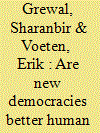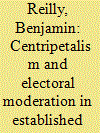| Srl | Item |
| 1 |
ID:
139804


|
|
|
|
|
| Summary/Abstract |
Recent scholarship finds that new democracies are more likely than established democracies to make binding commitments to international human rights institutions. Are new democracies also better at following through on these commitments? Stated differently, does their greater willingness to join international institutions reflect a genuine commitment to human rights reform or is it just “cheap talk?” We analyze this question using a new data set of more than 1,000 leading European Court of Human Rights (ECtHR) cases. Since new democracies face judgments that are more difficult to implement than established democracies, we employ a genetic matching algorithm to balance the data set. After controlling for bureaucratic and judicial capacity, we find that new democracies do implement similar ECtHR judgments initially more quickly than established democracies, but this effect reverses the longer a judgment remains pending. Although new democracies have incentives to implement judgments quickly, they sometimes lack checks and balances that help ensure implementation should an executive resist.
|
|
|
|
|
|
|
|
|
|
|
|
|
|
|
|
| 2 |
ID:
159908


|
|
|
|
|
| Summary/Abstract |
Centripetal approaches to ethnic conflict management seek to promote inter-ethnic accommodation and moderation by making politicians dependent on the electoral support of groups other than their own base. There is an ongoing debate about the utility of such approaches, including which kinds of electoral systems can best promote moderate and centrist politics in deeply divided societies. Neglected in this debate, however, has been the experience of ethnically diverse established democracies utilizing centripetal electoral models. This article examines historical evidence from Australia, and recent natural experiments with subnational electoral reform in the United States, which lend support to centripetal claims that preferential, “ranked choice” or “instant runoff” voting can encourage electoral moderation and address political polarization.
|
|
|
|
|
|
|
|
|
|
|
|
|
|
|
|